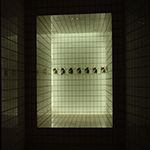Euroacademia Conferences
 Europe Inside-Out: Europe and Europeanness Exposed to Plural Observers (9th Edition) April 24 - 25, 2020
Europe Inside-Out: Europe and Europeanness Exposed to Plural Observers (9th Edition) April 24 - 25, 2020 Identities and Identifications: Politicized Uses of Collective Identities (9th Edition) June 12 - 13, 2020
Identities and Identifications: Politicized Uses of Collective Identities (9th Edition) June 12 - 13, 2020 8th Forum of Critical Studies: Asking Big Questions Again January 24 - 25, 2020
8th Forum of Critical Studies: Asking Big Questions Again January 24 - 25, 2020 Re-Inventing Eastern Europe (7th Edition) December 13 - 14, 2019
Re-Inventing Eastern Europe (7th Edition) December 13 - 14, 2019 The European Union and the Politicization of Europe (8th Edition) October 25 - 26, 2019
The European Union and the Politicization of Europe (8th Edition) October 25 - 26, 2019 Identities and Identifications: Politicized Uses of Collective Identities (8th Edition) June 28 - 29, 2019
Identities and Identifications: Politicized Uses of Collective Identities (8th Edition) June 28 - 29, 2019 The European Union and the Politicization of Europe (7th Edition) January 25 - 26, 2019
The European Union and the Politicization of Europe (7th Edition) January 25 - 26, 2019 7th Forum of Critical Studies: Asking Big Questions Again November 23 - 24, 2018
7th Forum of Critical Studies: Asking Big Questions Again November 23 - 24, 2018 Europe Inside-Out: Europe and Europeanness Exposed to Plural Observers (8th Edition) September 28 - 30, 2018
Europe Inside-Out: Europe and Europeanness Exposed to Plural Observers (8th Edition) September 28 - 30, 2018 Identities and Identifications: Politicized Uses of Collective Identities (7th Edition) June 14 - 15, 2018
Identities and Identifications: Politicized Uses of Collective Identities (7th Edition) June 14 - 15, 2018
Electoral Euroscepticism and the Economic Crisis: Evidence from a 100-Elections Panel Study Across Europe
-
-

-
Presentation speakers
- Francesco Nicoli, Trento University, Italy
- Download presentation
Abstract:
The recent European elections have shown a sharp rise in parties and independent parliament members generally perceived as “Eurosceptic”. Against this background, this paper analyses the interconnections between distressed economies, fall of confidence in traditional political parties, and the electoral success of hard-line Eurosceptic parties. On a panel of more than 100 elections between 2009 and December 2014, the random-effect model shows the relative impact of long and short term political trust, economic performance indicators, and institutional variables in determining the rise of hard-line Eurosceptic parties. In contrast with previous studies, which tended to de-emphasize the impact of economic performance in determining the success of Europescptic forces, the results of this paper detect both direct and mediated impact of the economic crisis and of bailout measures on the electoral success of hard-line Eurosceptic parties.
-
Related Presentations

Redefining the Meaning of Public Sphere: Leaders, Citizens, States
- Dora Papadopoulou

Insiders as Outsiders: European Women in Binational Marriages
- Julia Woesthoff

Narrating Europe from the Outside – The Double Peripheral Perspective in Abraham B. Yehoshua’s Novel Five Seasons
- Judith Müller

The Role of the EU in Setting Global Rules
- Anna Tsibulina














